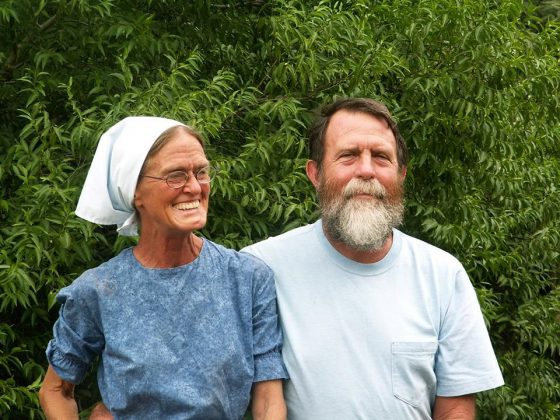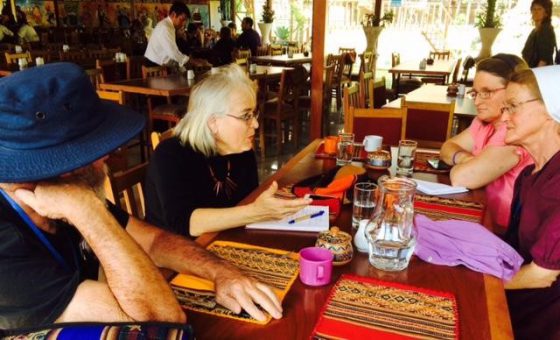Conservative Quakers Raise Cattle Sustainably in Bolivia
by Anthony Manousos (Clerk, Communications Group) and Jill Shook

We met Neva and Grant Kaufmann at World Plenary of Friends in Peru and were fascinated by their story. The Kaufmans have lived in Bolivia for several decades but they are not typical Bolivian Friends. They are Conservative Friends who moved to Bolivia from Iowa twenty years ago and became cattle ranchers. They live as simply and as sustainably as possible. Neva is a birthright Friend and Grant was born into a secular Jewish family. With their mostly homemade plain dress, they look like Friends who’ve stepped out of the 19th century.
Grant and Neva moved to an area in the southeast part of Bolivia called the Chaco, where the climate is extremely hot and arid. When they arrived, the pond on their property looked like pea soup. To make the water drinkable, they had to boil it over a wood fire. The cistern held rainwater, but it rains so rarely the water was insufficient. They couldn’t grow corn because it is too dry. The ground was unproductive. They lost cattle because there was not enough grass to feed them.
Through the Mennonites they learned about panicum gatton, a species of grass that grows in shade. They also learned about a system of ranching called sylvopastoralism, which is “the practice of combining forestry and grazing of domesticated animals in a mutually beneficial way.” Instead of cutting down trees to create a monoculture, the Kaufmanns planted panicum grass, which grows under trees and feeds their cattle. As a result of thispractice, the Kaufmanns began to see deer, wild pigs and new species of birds. As their ranch prospered, neighboring ranchers also began to follow their example.
They learned that certain trees called choroquete thrive in this dry climate. Their leaves taste like salad. In June through October they drop their leaves and help create a cushion, which the cattle like to lick up.
“It’s a beautiful symbiotic system,” explained Grant.
Their life hasn’t been easy. In the first year they killed over 300 poisonous snakes. They had to work hard to live sustainably but they have a happy family and a deep gratitude to God. Neva explained, “Our family loves to work and loves to have fun. They love to milk cows. One son wanted a cow since he was four years old. Nathan likes ranching, and Rachel trains horses. She loves animals and is very gentle and kind.”
Grant told us, “The biblical counsel ‘whatsoever thy hand findeth to do, do it with thy might’ has encouraged us to press ahead with the ranch at a time when Bolivia’s chronic political and legal instability, combined with threats of climate change, have discouraged many others.” He is thankful for all that he has been able to accomplish in South America.
We enjoyed many meals with Grant and Neva in Pisac, and we have kept in touch in the year that has passed. For us, the encounter with these Friends, living a particular but sustainable life, displays the essence of FWCC’s mission to bring Friends of varying traditions and cultural experiences together.

When we asked the Kauffmans what was most memorable about the FWCC Plenary, they responded: “Knowing again that we are not alone….The essence of our Friends community seems to be sharing the love of God, whether we call it that or something else. This was the Pisaq experience for us.”
To learn more about the Kaufmanns, including their spiritual journey, go to http://laquaker.blogspot.com/2016/10/conservative-quakers-raise-cattle.html.
